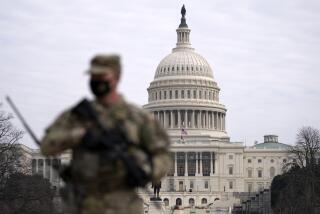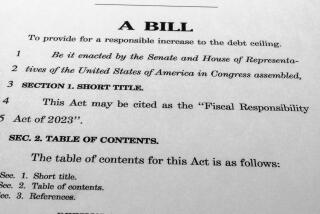House Votes to Force Reagan to Abide by Arms Treaties
- Share via
WASHINGTON — Despite a Republican outcry that Congress should not limit President Reagan’s bargaining position on arms control just before next month’s Moscow summit, the House voted overwhelmingly Wednesday to force Reagan to abide strictly by the Anti-Ballistic Missile and SALT II treaties.
The House voted, 252 to 159, to require the President for another year to abide by the traditional interpretation of the 1972 ABM Treaty, which prohibits testing of components of the controversial Strategic Defense Initiative, also known as “Star Wars.”
And by a vote of 240 to 174, the House passed a provision that would force the Administration to adhere to the limits imposed by the unratified SALT II treaty on specific classes of strategic weapons. Although Reagan observed these limits during most of his presidency, he has not done so for more than a year.
Adopted as Amendments
The arms-control provisions were adopted as amendments to a $299.5-billion defense spending measure for fiscal 1989, which begins next Oct. 1.
The ABM Treaty amendment, written by House Armed Services Committee Chairman Les Aspin (D-Wis.), is expected to be approved by the Senate and accepted by the President.
The Aspin amendment is patterned after a provision now in force as part of fiscal 1988 defense spending law. The Administration accepted that provision as part of a compromise designed to avoid a partisan clash over SDI testing, and Reagan has no plans to begin testing SDI components within the next year.
The SALT II provision, by contrast, has never been enacted into law even though it has been approved by the House for three consecutive years and was accepted by the Senate for the first time last year.
Before the measure could become law last year, Congress agreed as part of its arms-control compromise with Reagan to limit long-range U.S. nuclear weapons to existing levels. A similar compromise is expected to be adopted this year. The amendment requiring adherence with the SALT II limits was written by Rep. Norman D. Dicks (D-Wash.).
Most Contentious Issues
In the past, these arms-control provisions have been the most contentious issues in the annual defense spending bill. The apparent willingness of both Congress and Reagan to continue to abide by last year’s compromise on both of these issues reflects a recognition by both that the country is on the verge of electing a new President, whose views on arms control may differ from Reagan’s.
Like many Democrats, Dicks argued that the two amendments were intended only to “help us preserve the existing arms-control regime until we make progress in strategic arms talks.” Reagan and Soviet leader Mikhail S. Gorbachev have agreed in principle to slash the long-range nuclear arsenals of each superpower by half, but negotiators are still bargaining over the specifics.
House Republicans argued that passage of the arms-control amendments would limit Reagan’s flexibility in negotiating with Gorbachev during his visit to Moscow. Rep. John R. Kasich (R-Ohio) called it “the wrong message at the wrong time.”
“The President has been the most successful arms-control negotiator in the history of this country,” said Kasich, referring to the U.S.-Soviet treaty on intermediate-range nuclear weapons now being reviewed in the Senate. “We ought to be following the Reagan Doctrine, which is you operate from a position of strength to get real reductions in nuclear weapons.”
Sees ‘Unilateral Disarmament’
Rep. Henry J. Hyde (R-Ill.) said the amendments amounted to “unilateral disarmament of a benign but nonetheless serious sort.”
But when Hyde accused Aspin of allowing liberals to determine how to comply with the ABM Treaty, the Wisconsin Democrat replied: “The radical ultra-lib we negotiated this deal with was the secretary of defense in the Reagan Administration.”
Presidential politics crept into the debate when Rep. Duncan L. Hunter (R-Coronado) accused the Democrats of using the arms-control amendments to further “a Dukakis-Jackson arms-control agenda.”
Rep. Les AuCoin (D-Ore.) quickly replied that neither of the two surviving Democratic presidential candidates--Massachusetts Gov. Michael S. Dukakis or the Rev. Jesse Jackson--had anything to do with these proposals.
More to Read
Get the L.A. Times Politics newsletter
Deeply reported insights into legislation, politics and policy from Sacramento, Washington and beyond. In your inbox twice per week.
You may occasionally receive promotional content from the Los Angeles Times.










